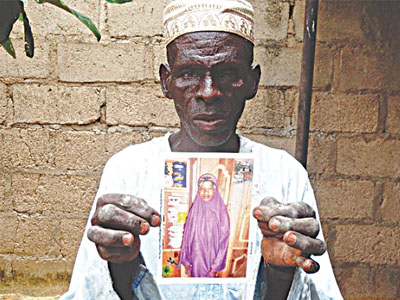 A HIGH Court in Gewaza, Bauchi State on Tuesday rejected a motion to have murder charges against a child bride accused of killing her husband dismissed, saying there was enough evidence for the case to proceed.
A HIGH Court in Gewaza, Bauchi State on Tuesday rejected a motion to have murder charges against a child bride accused of killing her husband dismissed, saying there was enough evidence for the case to proceed.
Wasila Tasi’u was 14 when she married Umar Sani, 35, in Nigeria’s deeply conservative, mainly Muslim north last year, and could face the death penalty if convicted of using rat poison to kill him.
“I am of the opinion that there is a case against the accused,” High Court Judge Mohammed Yahaya said. “As such, I overrule the submission of no-case from the defence counsel.”
The AFP reported that Tasi’u’s lawyers had argued that the state failed to establish her intent to kill Sani and questioned the reliability of a key prosecution witness.
The witness, a seven-year-old girl named Hamziyya who was identified as the sister of Sani’s other wife, testified that Tasi’u gave her money to buy the poison on April 5 last year, the day Sani died.
The defence said that relying on testimony from a minor contravened Nigeria’s Evidence Act and that the state’s case should therefore be thrown out.
The murder trial has highlighted the range of attitudes towards child marriage in Nigeria, especially in the impoverished north.
The families of both the deceased and the accused have rejected claims that she was forced to marry a man more than twice her age, noting that 14 was an appropriate age to marry and that Tasi’u chose Sani from a range of suitors.
Some locals have called for Tasi’u to face stiff punishment to discourage other girls from taking similar action if they become unhappy in their marriage.
But rights activists have demanded that Tasi’u be rehabilitated as a victim of a forced marriage, which likely included incidents of rape.
Laws regarding both sexual and marital consent are complex in northern Nigeria, given the coexistence of both secular and Islamic law, creating contradictions in the justice system.
Tasi’u has remained largely stoic through her appearances in court so far, crying when charges were first read against her, but otherwise sitting silently, often with her head bowed.
On Tuesday she stood quietly in the dock, with her head fully covered in a sky-blue hijab.
Sani died after eating food that Tasi’u allegedly prepared for a meal to celebrate their marriage. Three others who reportedly ate the food also died, but prosecutors have combined the three deaths into a single murder charge.
The state has concluded its case and following Tuesday’s ruling the defence was instructed to move forward with its own evidence when the trial resumes on April 29.



